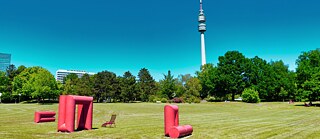Birthplace of the Economic Miracle
The “Ruhrgebiet” used to have hundreds of coal pits and steel mills. It was the heart and soul of the so-called German economic miracle that pulled the country out of the rubble and poverty after World War II. Today Dortmund is known as a green metropolis. Nearly half the city’s area consists of waterways, woodland, and spacious parks.
A Destructive Surprise
Earthquakes occur several times a year in Germany at magnitudes that are relatively low by international standards. However, the 1661 quake was strong enough to severely damage Dortmund’s Protestant Reinoldikirche. It was reconstructed and is now the oldest extant church in Dortmund.
Ready to Rumble
Seismologists may not agree, but there are strong earthquakes in Dortmund every other Saturday. They strike when Borussia Dortmund steps on the field to ear-splitting roars from the crowd. Borussia is one of Germany’s most beloved and successful teams. It has won seven German championships including the 2011 title and the Champions League. Borussia has one of the biggest fan communities with more than 25 million supporters and 550 fan clubs around the world.
You’ll Never Walk Alone
Signal Iduna Park is Germany’s biggest stadium. With an average attendance of 77,000, Borussia is way ahead of teams like Real Madrid and AC Milan. The south stand has a capacity of 25,000 and is the largest stadium standing area in Europe. The sea of yellow and black is one of the most imposing sights in world soccer. The German national team schedules their most difficult games here, as they can rely on the support of the Dortmund fans.
Fan Food
On a regular Bundesliga gameday fans at the Signal Iduna Park consume about 57,000 cups of beer, 12,000 grilled sausages, 2,000 frankfurters, 1,800 pizzas, 1,500 schnitzel, 1,500 hamburgers, 3,500 pretzels, and 2,500 candy bars.
The Wunderkind
When Borussia’s Nuri Sahin took to the field in August 2005 he was 16 years old becoming the youngest ever Bundesliga player. Sahin who grew up in Germany and is of Turkish nationality, is now a star on the Turkish national team. He was Borussia’s captain before he signed a contract with Real Madrid in the summer of 2011.
Germany’s Power Drink
By the end of the 19th century, Dortmund had 150,000 inhabitants and almost 30 breweries. The steel-making and coal-mining city had more breweries than any other German city, with a large army of thirsty industrial workers to satisfy. By the 1950s more beer was made in Dortmund than anywhere else in the world, save Milwaukee, Wisconsin. But Germans are not the world champs when it comes to drinking beer. They come in third after the Czech and the Irish.
Better Safe Than Sorry
As a regional center, Dortmund is home to several important insurance companies, among them Signal Iduna, one of Borussia’s main sponsors. Insurance in Germany is a lucrative business as no other country takes out as many insurances: liability, accident, health… Yes, you may get the impression Germans are rather risk averse.
German-American Friendship
The origins of the Buffalo-Dortmund sister city relationship can be traced back to 1972. A Dortmund native, Herbert Morgenroth, arrived in Buffalo as an exchange teacher at the University of Buffalo. He was struck by the similarities between the two cities. Both were about the same size; they were the sites of huge steel companies and they were famous for their beer production – ideal conditions for a transatlantic partnership.
